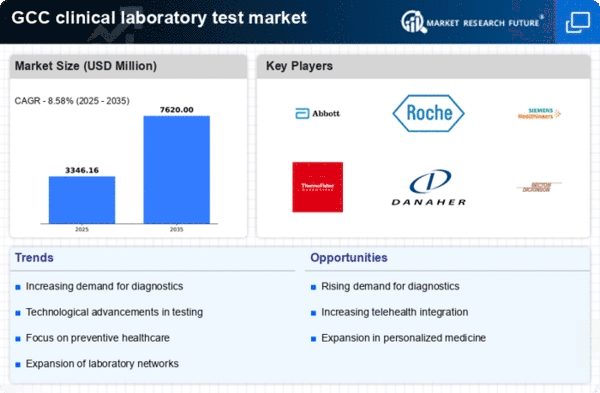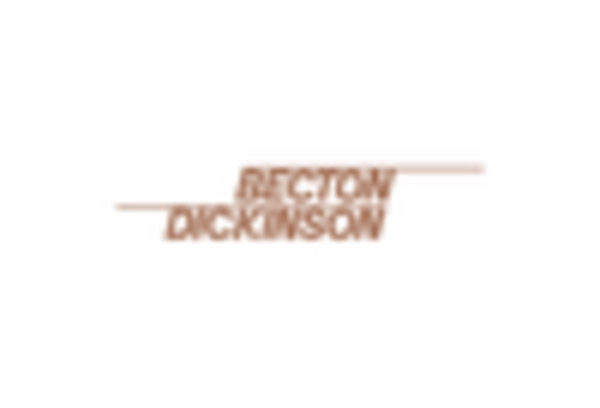Increased Healthcare Expenditure
Healthcare expenditure in the GCC is on the rise, driven by both government and private sector investments. The region's commitment to improving healthcare infrastructure and services is evident, with spending projected to reach approximately $100 billion by 2025. This increase in funding is likely to enhance the capabilities of clinical laboratories, allowing for the adoption of advanced testing technologies and improved service delivery. As healthcare facilities expand and modernize, the clinical laboratory-test market is expected to benefit from increased demand for a wide range of diagnostic tests, including molecular diagnostics and genetic testing, which are becoming essential in personalized medicine.
Growing Awareness of Early Diagnosis
There is a notable increase in public awareness regarding the importance of early diagnosis and preventive healthcare in the GCC. Campaigns promoting health screenings and regular check-ups are gaining traction, leading to a higher demand for laboratory tests. This shift in consumer behavior is likely to drive the clinical laboratory-test market, as individuals seek proactive measures to monitor their health. The market may see a surge in demand for tests related to infectious diseases, metabolic disorders, and genetic conditions, as people become more informed about their health risks and the benefits of early detection.
Rising Prevalence of Chronic Diseases
The increasing incidence of chronic diseases in the GCC region is a primary driver for the clinical laboratory-test market. Conditions such as diabetes, cardiovascular diseases, and cancer are becoming more prevalent, necessitating regular testing and monitoring. According to recent health statistics, the prevalence of diabetes in the GCC is estimated to be around 16.3%, which is significantly higher than the global average. This trend is likely to propel the demand for laboratory tests, as healthcare providers seek to manage these conditions effectively. The clinical laboratory-test market is expected to expand as healthcare systems adapt to the growing need for diagnostic services, thereby enhancing patient outcomes and reducing long-term healthcare costs.
Technological Integration in Healthcare
The integration of advanced technologies in healthcare is transforming the clinical laboratory-test market. Innovations such as artificial intelligence, machine learning, and automation are streamlining laboratory processes, enhancing accuracy, and reducing turnaround times for test results. The GCC region is witnessing a gradual adoption of these technologies, which could potentially improve the efficiency of clinical laboratories. As healthcare providers increasingly rely on technology to deliver timely and accurate diagnostics, the clinical laboratory-test market is likely to experience growth, driven by the demand for high-quality testing services that meet the evolving needs of patients and healthcare systems.
Regulatory Support for Laboratory Standards
Regulatory bodies in the GCC are actively working to establish and enforce standards for laboratory testing, which is crucial for ensuring quality and reliability in the clinical laboratory-test market. These regulations aim to enhance patient safety and improve diagnostic accuracy, fostering trust in laboratory services. As compliance with these standards becomes mandatory, laboratories are likely to invest in quality management systems and accreditation processes. This regulatory support may lead to an increase in the number of accredited laboratories, thereby expanding the clinical laboratory-test market and ensuring that patients receive high-quality diagnostic services.

















